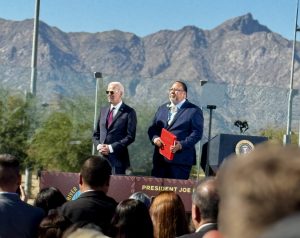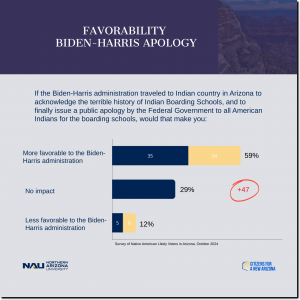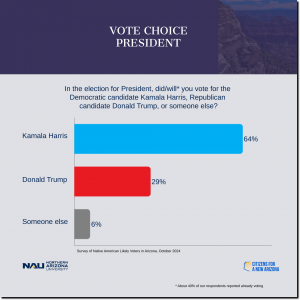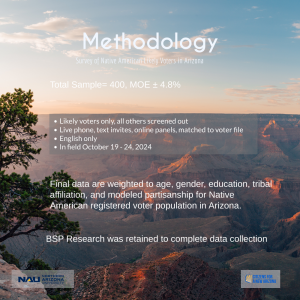By Stephen Nuño-Perez
 The lab released findings from our survey on Native American likely voters in Arizona on Friday, October 25. The survey asked questions about issue preference, vote choice, outreach, and attitudes towards President Joe Biden’s apology to Native Americans for the government’s policies on Indian Boarding Schools.
The lab released findings from our survey on Native American likely voters in Arizona on Friday, October 25. The survey asked questions about issue preference, vote choice, outreach, and attitudes towards President Joe Biden’s apology to Native Americans for the government’s policies on Indian Boarding Schools.
About the Survey
This marks one of the only known pre-election surveys of the Native American voting community in Arizona in this election cycle. Dr. Stephen Nuño-Perez, a Professor with the Department of Politics and International Affairs, oversaw the design, implementation, and presentation of the results.
Dr. Nuño-Perez is a Faculty Fellow for the Dr. Richard Young endowment and serves as a consultant and data analyst for BSP Research, a private polling firm. Dr. Nuño-Perez’s work with BSP Research focuses on non-profit organizations and ensuring that underrepresented communities are properly represented in methodological approaches. He does not work for any political campaigns. The survey was funded by Northern Arizona University’s Dr. Richard Young Endowment and the non-partisan political action committee, Citizens for a New Arizona. Citizens for a New Arizona was started by Ms. Karan English, Arizona’s second woman to be elected to Congress.
Selected Findings
Respondents were asked if they support recognizing the history of Indian Boarding Schools and issuing an apology on behalf of the federal government. Ninety percent of the survey respondents said they support or strongly support such action.
Respondents were also asked who they voted for or plan to vote for in the upcoming race for President; sixty-four percent said they voted for or will vote for Kamala Harris, and twenty-nine percent said they voted for or plan to vote for Donald Trump. About forty percent of our sample reported having already voted, whether through mail or drop box.


Methodology
The survey fielded from October 19 until October 24th. BSP Research was retained to conduct the survey and provide the sample. Respondents were selected randomly and screened to achieve a representative sample. The survey did not model Native Americans who lived on reservations, but instead asked respondents to self-report if they lived on or near a reservation. The project collected 400 completed surveys and weighted responses to age, gender, education, tribal affiliation, and modeled partisanship for the Native American registered voter population in Arizona. Surveys were conducted via digital, text, phone, and online panels, and matched to voter files. The margin of error for the sample is ±4.9 %. Complete cross tabulations and topline results can be downloaded by clicking the links below.
Topline results Accordion Closed
Click to Download
